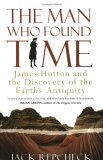Summary | Excerpt | Reviews | Readalikes | Genres & Themes | Author Bio

Critics' Opinion:
Readers' Opinion:
First Published:
Apr 2003, 256 pages
Paperback:
Jul 2004, 256 pages
Looking So Far Into the Abyss of Time
On a sunny June afternoon in 1788, three gentlemen from
Edinburgh, along with several farmhands, boarded a boat on a desolate
Scottish beach. After clearing the waves, they began sailing south along
the North Sea coast. The men were in search of a rock exposure on the
battered cliffs that would prove one of the most stunning claims in the
history of science—that the earth was ancient beyond calculation. In the
late eighteenth century, as in all centuries since the formation of the
Christian church, this was a blasphemous statement. The Scottish
Presbyterian Church, the English Anglican Church, the Lutheran Church, and
the Catholic Church—indeed, all Christian churches, their clergies, and
their followers—believed that the earth was not even 6,000 years old.
This belief was a tenet based on rigorous analysis of the Bible and other
holy scriptures. It was not just the devout who embraced this belief; most
men of science agreed that the earth was young. In fact, the most famous
of them all, Isaac Newton, had completed a formal calculation of the age
of the earth before he died in 1727, and his influential chronology
confirmed that the biblical scholars were right.
The assertion that the earth was not so young had been made
by one of the gentlemen seated in the boat. Three years earlier, Dr. James
Hutton, an amateur naturalist who had spent decades studying minerals and
their positions in the earth, had addressed an audience of the Royal
Society of Edinburgh, which included some of Europe's most accomplished
men of science. He boldly announced that his theory of the earth indicated that it was immeasurably old. Though he certainly
commanded the
attention of his audience that day, he did not persuade many. Perhaps no
one. Because of his failure to gain adherents to his theory, one that he
felt was so obviously true, Hutton had spent the last three years doing
focused fieldwork in an effort to find geologic formations that would
convince his skeptics. Two of them were with him in the boat.
Hutton was now sixty-two years old, but had the energy and
stamina of a much younger man. Bald and very thin, he must have looked a
bit like Washington Irving's character Ichabod Crane; attached to his
long, thin face was a prominent aquiline nose, and his portrait suggests
that he had spindly arms and legs. Acquaintances observed that he tended
to dress in the same shade of brown nearly every day, and his plain attire
was rather out of fashion. Although Hutton had a medical degree, he never
practiced medicine and his private income allowed him to lead a life of
leisure. Unmarried, he lived with his sisters in a comfortable house in
Edinburgh.
Most who knew the doctor agreed that he was a bit odd, or at
least eccentric. But, lovably so. He often seemed to lose sight of
himself, making unusual faces and movements when he became excited: "The
fire of his expression on such occasions, and the animation of his
countenance and manner, are not to be described; they were always seen
with great delight by those who could enter into his sentiments, and often
with great astonishment by those who could not." This passion was
especially apparent when he was engaged in conversation, speaking in his
broad Scots accent, about some topic that interested him. And it seemed
that nearly every topic did interest him. Despite his quirks, his numerous
friends were devoted to him, and they recognized that he was a serious and
able scholar.
One of the two skeptics on board was John Playfair. A
professor of mathematics at the University of Edinburgh since 1785, he was
considered among the cleverest men in Scotland, a nation unusually blessed
with distinguished intellects at this time. Handsome for his forty years,
and very popular in Edinburgh, he had a square jaw and a full head of dark
hair combed forward like that of Julius Caesar. Playfair was a brilliant
algebraist, geometer, and astronomer, and in the years ahead he would
write what would become the standard text in Euclidian geometry for the
next half century. Though he had first met Hutton in 1781, he did not know
what to expect from Hutton's 1785 lectures. Playfair was as stunned as
everyone else in the room by the assertion that the earth was ancient. As
a former Presbyterian minister, he had long ago internalized the Scottish
church's teaching about the young earth.
Excerpted from The Man Who Found Time by Jack Repcheck. Copyrighted by Jack Repcheck 2003, all rights reserved. No part of this book may be reproduced without written permission from the publisher, Perseus Publishing.





The House on Biscayne Bay
by Chanel Cleeton
As death stalks a gothic mansion in Miami, the lives of two women intertwine as the past and present collide.

The Flower Sisters
by Michelle Collins Anderson
From the new Fannie Flagg of the Ozarks, a richly-woven story of family, forgiveness, and reinvention.

The Funeral Cryer by Wenyan Lu
Debut novelist Wenyan Lu brings us this witty yet profound story about one woman's midlife reawakening in contemporary rural China.
Your guide toexceptional books
BookBrowse seeks out and recommends the best in contemporary fiction and nonfiction—books that not only engage and entertain but also deepen our understanding of ourselves and the world around us.